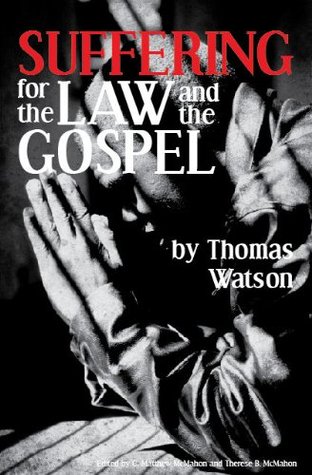- Bible
- Read the Bible
- Bible Versions
- Verse of the Day
- Reading Plans
- Verses by Topic
- Books of the Bible
- Bible Images
- Study
- Commentaries
- Concordances
- Dictionaries
- Encyclopedias
- Sermons
- Bible Atlas & Maps
- BP Wiki
- Devotionals
- Today's Devotionals
- Light of the World
- All Devotionals
- Inspirational Quotes
- More
- Picture Quotes
- Videos
- Inspirational
- Bible Study
- What The Bible Says
- Bible Q&As
- Daily Bread
- Bible by Genre
- Bible Stories
- Random Bible Verse
- Community
- Store
Suffering for the Law and the Gospel
by Thomas Watson
Thomas Watson (1620-1686) was one of the most highly esteemed nonconformist Puritans of his day, as well as being an extremely popular preacher for today’s Reformed and Christian audience via his works. Most of Thomas Watson’s works are in print. They are filled with sound doctrine, practical wisdom, and heart-searching application. He is one of the most well-known and quoted Puritans.
This rare and never before published work is a treatise on Revelation 11:3, “And I will give power to my two witnesses, and they shall prophesy a thousand two hundred and three score days clothed in sackcloth.” Watson explains who the two witnesses are, and makes practical application of how Christians today must and will suffer persecution for the sake of the Law and the Gospel. The Law is a reflection of who God is. The Gospel is an announcement of what God does, and has done through Jesus Christ on the cross. As a result, Watson shows that it is expedient we should pass under the cross, to inherit the crown of glory.
This is not a scan or facsimile, and has been updated in modern English for easy reading. It also has an active table of contents of electronic versions.
This rare and never before published work is a treatise on Revelation 11:3, “And I will give power to my two witnesses, and they shall prophesy a thousand two hundred and three score days clothed in sackcloth.” Watson explains who the two witnesses are, and makes practical application of how Christians today must and will suffer persecution for the sake of the Law and the Gospel. The Law is a reflection of who God is. The Gospel is an announcement of what God does, and has done through Jesus Christ on the cross. As a result, Watson shows that it is expedient we should pass under the cross, to inherit the crown of glory.
This is not a scan or facsimile, and has been updated in modern English for easy reading. It also has an active table of contents of electronic versions.
BUY NOW
Kindle Edition, 72 pages
Published September 25th 2012 by Puritan Publications
© 2025 Bibleportal.com All rights reserved.

He was educated at Emmanuel College, Cambridge, where he was noted for remarkably intense study. In 1646 he commenced a sixteen year pastorate at St. Stephen's, Walbrook. He showed strong Presbyterian views during the civil war, with, however, an attachment to the king, and in 1651 he was imprisoned briefly with some other ministers for his share in Christopher Love's plot to recall Charles II of England.
He was released on 30 June 1652, and was formally reinstated as vicar of St. Stephen's Walbrook. He obtained great fame and popularity as a preacher until the Restoration, when he was ejected for nonconformity. Not withstanding the rigor of the acts against dissenters, Watson continued to exercise his ministry privately as he found opportunity. Upon the Declaration of Indulgence in 1672 he obtained a license to preach at the great hall in Crosby House. After preaching there for several years, his health gave way, and he retired to Barnston, Essex, where he died suddenly while praying in secret. He was buried on 28 July 1686.
Thomas Watson was an English, non-conformist, Puritan preacher and author.
He was educated at Emmanuel College, Cambridge, where he was noted for remarkably intense study. In 1646 he commenced a sixteen year pastorate at St. Stephen's, Walbrook. He showed strong Presbyterian views during the civil war, with, however, an attachment to the king, and in 1651 he was imprisoned briefly with some other ministers for his share in Christopher Love's plot to recall Charles II of England.
He was released on 30 June 1652, and was formally reinstated as vicar of St. Stephen's Walbrook. He obtained great fame and popularity as a preacher until the Restoration, when he was ejected for nonconformity. Not withstanding the rigor of the acts against dissenters, Watson continued to exercise his ministry privately as he found opportunity. Upon the Declaration of Indulgence in 1672 he obtained a license to preach at the great hall in Crosby House. After preaching there for several years, his health gave way, and he retired to Barnston, Essex, where he died suddenly while praying in secret. He was buried on 28 July 1686.
... Show more